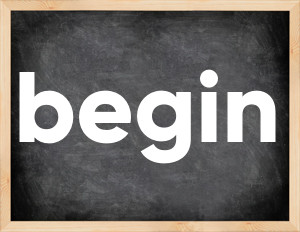 The English verb 'begin' is pronounced as [bɪˈgɪn].
The English verb 'begin' is pronounced as [bɪˈgɪn].
Related to:
irregular verbs.
3 forms of verb begin: Infinitive (begin), Past Simple - (began), Past Participle - (begun).
Here are the past tense forms of the verb begin
👉 Forms of verb begin in future and past simple and past participle.
❓ What is the past tense of begin.
Begin: Past, Present, and Participle Forms
| Base Form | Past Simple | Past Participle |
|---|---|---|
| begin [bɪˈgɪn] |
began [bɪˈgæn] |
begun [bɪˈgʌn] |
What are the 2nd and 3rd forms of the verb begin?
🎓 What are the past simple, future simple, present perfect, past perfect, and future perfect forms of the base form (infinitive) 'begin'?
Learn the three forms of the English verb 'begin'
- the first form (V1) is 'begin' used in present simple and future simple tenses.
- the second form (V2) is 'began' used in past simple tense.
- the third form (V3) is 'begun' used in present perfect and past perfect tenses.
What are the past tense and past participle of begin?
The past tense and past participle of begin are: begin in past simple is began, and past participle is begun.
What is the past tense of begin?
The past tense of the verb "begin" is "began", and the past participle is "begun".
Verb Tenses
Past simple — begin in past simple began
(V2).
Future simple — begin in future simple is begin (will + V1).
Present Perfect — begin in present perfect tense is
begun
(have/has + V3).
Past Perfect — begin in past perfect tense is
begun
(had + V3).
begin regular or irregular verb?
👉 Is 'begin' a regular or irregular verb? The verb 'begin' is irregular verb.
Examples of Verb begin in Sentences
- She began the quilt last week (Past Simple)
- The virus can begin to replicate (Present Simple)
- He interrupted as soon as they began to vote (Past Simple)
- We can begin tomorrow (Present Simple)
- The English lesson has already begun (Present Perfect)
- The program will begin in 5 minutes (Future Simple)
- Some countries have begun to tackle the issue (Present Perfect)
- You can please wait here, the experiment will begin shortly (Present Simple)
- Put your money on the table and we will begin (Present Simple)
- In truth, your journey has already begun (Present Perfect)